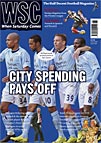 Dear WSC
Dear WSC
Bruce Wilkinson (WSC 267) pointed out that ticket queues “seem a quaint ritual of a bygone age”. Waiting in a virtual internet queue bears no similarity to lining up outside the box office. I have my tickets for the FA Cup final, but I do not feel as if I earned them. Instead of getting up in the middle of the night, crossing London, losing half a day’s work, standing in the rain shuffling forward inch by inch while nervous that there are too many punters and too few tickets, I merely sat in my dressing-gown in front the PC. There is no one to talk to in the “virtual waiting room”. Your opportunity is allotted randomly. Suddenly it’s all over and you have what you came for. One should be happier as the process is simple and efficient and the desired result achieved, but somehow it feels like a hollow victory as it lacks the sense of accomplishment joy and triumph of the old-fashioned process. You can’t even wave the tickets in triumph above your head as they are sent by post.Obviously my complaining about the changes that actually improve my life marks me down as “old”. I am not asking to bring back rickets and polio and to repeal the Factory Acts but I do miss a modicum of discomfort and inconvenience. The old experience was akin to standing on the terraces or being subject to the over-zealous policing that used to mark us out as a tribe. Under the new regime the tickets are yours if your broadband speed is faster and your credit card more golden than the next, rather than if you have more commitment stamina and perseverance.Will the ultimate progress be when we treat football like theatre and opera by dressing-up smartly for the occasion and ordering our interval drinks? Or is that Club Wembley?
Patrick Sheehy, London
Search: ' Supporters Direct'
Stories
 On the 40th anniversary of the “football war” Jonathan Barker asks if a World Cup play-off really led to armed conflict
On the 40th anniversary of the “football war” Jonathan Barker asks if a World Cup play-off really led to armed conflict
On December 29, 1968, Honduras, widely regarded one as of the lesser lights of Central American football, caused a major surprise in the 1970 World Cup eliminators by overcoming a Costa Rica side that had been favoured to qualify for Mexico. Their opponents in the next round would be neighbouring El Salvador. Seemingly of little interest to the outside world, the three games the countries played in June 1969 would become the focal point of simmering tensions between the two governments, with the subsequent conflict coming to be known, however misleadingly, as the “football war”.
 Dear WSC
Dear WSC
AFC Wimbledon fan Aled Thomas (Letters, WSC 267) bemoans people not knowing what to call his club. He would have enjoyed this exchange on Talksport on a recent Saturday when they decided to venture south of the Premier League, for a change. Ian Danter: “AFC Wimbledon could gain promotion to the Conference today.” Micky Quinn: “Is that the original club?” Danter (hesitantly): “Yes.” Quinn: “Do they still play at Plough Lane?” Why so knowledgeable?
Glyn Berrington, Brierley Hill
 Joel Richards reports on a new initiative to curb fan violence in Argentina that sounds strangely familiar – and comes at a price
Joel Richards reports on a new initiative to curb fan violence in Argentina that sounds strangely familiar – and comes at a price
Going to a match in Buenos Aires is one of the main attractions on offer in the capital city, but the price of watching football is set to increase considerably. The Argentine Football Association (AFA) is looking to implement a £41 million project to register football fans, modernise the game’s infrastructure and eradicate violence from the stands. The Supporters Identification Register (PUAI in its Spanish initials) will oblige an estimated four million football fans to register officially in order to attend matches. Paper tickets will no longer exist, and supporters (including tourists) will have to buy online, at cash points or with prepaid vouchers.
 The arrest of Steaua Bucharest’s zealous owner has sparked hope that his power might finally be waning, writes Jonathan Wilson
The arrest of Steaua Bucharest’s zealous owner has sparked hope that his power might finally be waning, writes Jonathan Wilson
For the Steaua Bucharest owner Gigi Becali to berate underperforming players is nothing unusual; what is less common is for the player to answer back, particularly with the wit (at least, you assume he was joking) shown by Dayro Moreno. The Colombian forward’s form has been poor since the winter break, and Becali, using his coach Marius Lacatus as a translator, was pointing out his deficiencies with characteristic robustness. “Dayro,” he said finally. “What’s wrong with you?” “Boss,” Moreno, “my form has dipped because I was so worried about you when you were arrested.” Becali, as he tends to be when his ego is flattered, however mockingly, was charmed. “He may act like a child,” he said, “but he’s the only real footballer we have.”